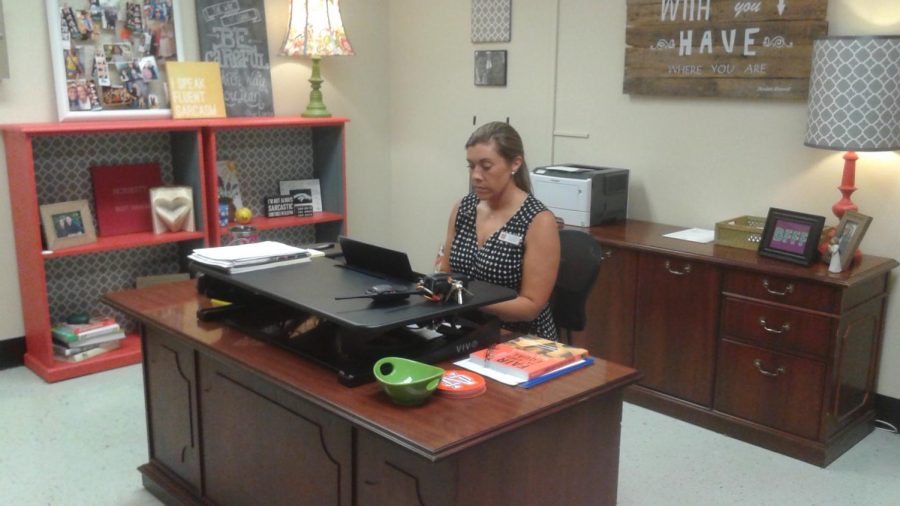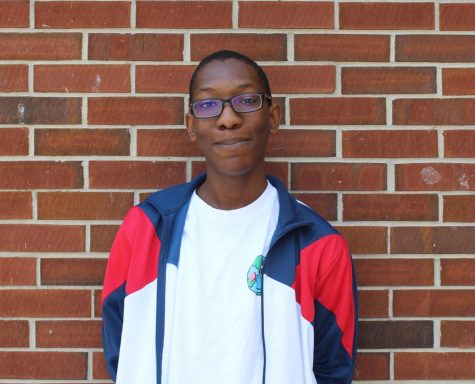Bultman Returns to NC: This Time as Assistant Principal
Assistant Principal Alexia Bultman sits in her office in the 600 hall, examining documents from administration. Bultman took the position of Assistant Principal at the start of this semester, already making her mark on campus by implementing the new school dress code. Unknown to most students, Bultman actually attended NC as a teen graduating among the class of 2000; during her time, she gained notoriety for her dedication to the Lady Warriors softball team, playing the sport all four years.
August 27, 2019
As every year comes and goes, the world around us changes: the weather shifts in and out of seasons, landscapes fall or rise, and the practices and structure of our cultures evolve. This sentiment should surprise no one, life just works this way. This sentiment applies especially to the hierarchies in society. Most assume this applies exclusively to political hierarchies, and although it does apply: laws pass and leaders grow wiser, it does not do so exclusively. Change occurs often in structures without any political goals. Case in point, NC recently saw a minor but impactful shakeup in its administration with a new Assistant Principal, Alexia Bultman.
When it comes to leading a group of people, knowing them helps considerably in the decision-making process. However, spending long periods of time away from those people may lessen one’s ability to understand their ongoing issues. Both sentiments certainly apply to Mrs. Bultman, who, despite possessing a bond to the school itself, surprised faculty and students when she filled the new position, and now finds herself in a rather foreign environment.
“I am a graduate of North Cobb, specifically the class of 2000. North Cobb at that point in time was very different from how it is now. The biggest thing is just the building in and of itself [is] completely different: the science building is…completely new, the Deal Building…, Freshman Academy…, the 800 halls did not exist,” Bultman said.
A crucial part of the role of Assistant Principal revolves around the ability to understand what your staff may struggle with, and what steps would help ease this: this can range from helping custodians clean the lunchroom to working with administrators to enforce a new dress code (both of which Bultman does). Generally speaking though, the new Assistant Principal will spend most of her time coordinating with teachers and staff to help with all of their struggles. Unlike others in her position, Bultman does not just aid in solving their issues but can also empathize with the struggles NC teachers face, due in large part to experiencing similar ones herself for over a decade.
“I spent 11 years in the classroom, and I taught various levels of biology and Advanced Placement (AP) Environmental Science, as well as a few semesters of Anatomy, Physiology, and Physics. As for how that lead me down my current path, leadership has always been a passion of mine, so when the opportunity to enter administration opened, I went through the door. In terms of why I wanted to become an Assistant Principal, [I wanted] to be able to help and support teachers: my number one goal is to never lose sight of what it was like to be a teacher, so being that support [system] is my top priority,” Bultman said.
Running any organization takes its fair share of work: one must always account for any money involved, pleasing the public while still retaining their autonomy, and staying level-headed with an always uncertain future ahead of them.
Now put someone in charge of running a school and dealing with the resulting complications (accommodating the needs of various life situations, a general lack of funding, and holding the responsibility for the safety and education of an entire legion of children), and the difficulty grows exponentially. Any of these can easily apply to Mrs. Bultman, but in her mind, the real struggles of her job come from something so complex yet simple as human interaction.
“There are a lot of hard parts [to my job], so I can’t differentiate the hardest. But discipline is never a fun job. Interacting with a wide variety [of people] can be positive, but it can also be a downfall. You have to be able to work with, address, and interact with a wide variety of personalities. Sometimes those personalities don’t mesh well with yours, and sometimes frustrations can come from that. Another hard part of the job is the balance between supporting teachers but also pushing them to always be better while recognizing that there are going to be bumps in the road. So there’s a dynamic tension between offering that support, but also pushing them to extremely high standards,” Bultman said.
Besides the difficulties, fear can also manifest upon starting a new job: the fear of failure, the fear of a bad first impression, the fear of not stacking up to your colleagues. Bultman served as no exception to this rule, as she admitted to feeling a degree of fear on her first day at NC, these fears stemming from the previously mentioned inability to predict human behavior, as well as simply not knowing about existing hierarchies.
“Any time an educator is new to a building, there are fears of the unknown. What are the processes and procedures in that school? Who are the people? How do you interact with those people? So I think any fears that I did have were just natural ones that come from not knowing,” Bultman said.
In spite of any struggles or fears that come with the new job, Bultman still manages to perform her job as effectively. While the return to her alma mater may make her an outsider to its new features, it also grants her firsthand insight into what does and does not work. When prompted on her hopes for the year, she mentioned a single one that, while fairly simple, shows exactly why she got the job in the first place.
“Of course I’m optimistic [for this school year]. To me, every year is a great year. It’s another opportunity to do new things, try new things, and learn from your mistakes, [as] I’m a big proponent of taking risks and also learning from them. My hope [for this year] is always to get better. So if there’s a policy in place that is working and is official, is there a way to clarify that and improve that? So my hope is to get better and do better, “ Bultman said.







